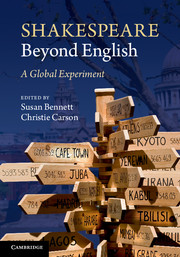Book contents
- Frontmatter
- Contents
- List of Illustrations
- List of colour plates
- Notes on contributors
- Foreword
- Acknowledgements
- Introduction
- The Globe to Globe Festival: An Introduction
- Performance Calendar
- Week One
- Week Two
- Week Three
- Week Four
- Week Five
- Week Six
- Chapter Thirty-Five Habima Merchant of Venice
- Chapter Thirty-Six Patriotism, Presentism and the Spanish Henry VIII
- Chapter Thirty-Seven Touch and Taboo in Roy-e-Sabs’ The Comedy of Errors
- Chapter Thirty-Eight Shakespeare and the Euro-crisis
- Chapter Thirty-Nine Restaging Reception
- Chapter Forty Reviving Hamlet? Nekrošius’ Lithuanian ‘Classic’
- Afterwords
- Index
- Plate section
- References
Chapter Thirty-Six - Patriotism, Presentism and the Spanish Henry VIII
The tragedy of the migrant queen
Published online by Cambridge University Press: 05 June 2014
- Frontmatter
- Contents
- List of Illustrations
- List of colour plates
- Notes on contributors
- Foreword
- Acknowledgements
- Introduction
- The Globe to Globe Festival: An Introduction
- Performance Calendar
- Week One
- Week Two
- Week Three
- Week Four
- Week Five
- Week Six
- Chapter Thirty-Five Habima Merchant of Venice
- Chapter Thirty-Six Patriotism, Presentism and the Spanish Henry VIII
- Chapter Thirty-Seven Touch and Taboo in Roy-e-Sabs’ The Comedy of Errors
- Chapter Thirty-Eight Shakespeare and the Euro-crisis
- Chapter Thirty-Nine Restaging Reception
- Chapter Forty Reviving Hamlet? Nekrošius’ Lithuanian ‘Classic’
- Afterwords
- Index
- Plate section
- References
Summary
When Rakatá's performance of Henry VIII took place in late May, almost at the closing of the Globe to Globe Festival, Spain was about to win their third consecutive international football tournament and to hear from its government that the economic crisis that had started four years ago was only getting worse. I wonder if, at some point before the Madrid-based company took the stage, the organizers of the Festival asked themselves whether they would be getting the Spain that wins consecutive Euro Cups or the Spain whose possible financial rescue was on the verge of doing half the continent irremediable economic damage. Rakatá's project sprang from the second scenario. Recently renamed Fundación Siglo de Oro (Golden Age Foundation) – probably seeking not only to market the project as an exclusively early modern enterprise but also to facilitate their search for financial help from public administrations – the company struggled to land the part of the budget required to accept the Globe's (only part-funded) invitation. Weeks before the performance, the same newspapers that had triumphantly announced the first Spanish expedition to the Globe echoed the company's complaints about the lack of institutional support. Thus, the prospects of Rakatá's portrayal of Henry VIII's reign, which was to defend Spanish cultural pride by ‘bearing our country's flag in the London Cultural Olympiad’, were momentarily clouded as a consequence of the country's long economic backlash. Rakatá's protest was expressed by its ‘profoundly disappointed’ founder and director, Rodrigo Arribas, within the rhetorical boundaries of the two hottest topics in Spain around the late spring/early summer of 2012: football and the economy – ‘it is as if the players in the national team had to pay for their boots and shirts themselves’.
- Type
- Chapter
- Information
- Shakespeare beyond EnglishA Global Experiment, pp. 273 - 281Publisher: Cambridge University PressPrint publication year: 2013

